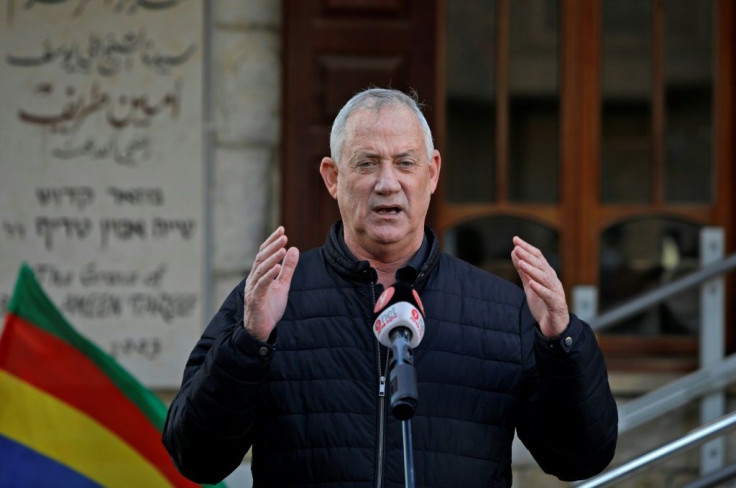As Israel Poll Looms, 'No Regrets' For Ex-general In PM Duel
A year ago, centrist Benny Gantz got a shot at forming a government, but now he faces potential political oblivion, barely a week ahead of Israel's fourth election in two years.
The ex-military chief's Blue and White political alliance won 33 seats in the March 2020 polls, before he fell just short of cobbling together a coalition in the 120-seat legislature.
Weeks later, he shocked supporters by joining Prime Minister Benjamin Netanyahu -- his right-wing nemesis -- in a precarious unity government, as a first wave of the coronavirus pandemic shook the country.
"I don't regret agreeing to join the coalition, because I did it out of responsibility towards the state of Israel at a time of crisis," Gantz told AFP in an interview on Friday.
But his alliance was broken by the move.

Many considered it a betrayal, especially after two similarly close elections in 2019 established Gantz as the standard-bearer of efforts to unseat Israel's longest-serving prime minister.
His deal with Netanyahu -- Israel's first premier to stand trial for corruption while in office -- saw him become defence minister on the understanding the two men would swap roles after 18 months.
The uneasy arrangement acrimoniously fell apart in December, with Gantz's camp accusing Netanyahu and his Likud party of deliberately stalling on a budget so as to cling onto the premiership.
"I deplore the result", Gantz told AFP.
Parliament was duly dissolved and an election called for March 23, plunging the nation into fresh political uncertainty.
The need for yet another national poll is the "sole" responsibility of Netanyahu, he added.

By going into government with his rival, Gantz, 61, provoked half of his lawmakers into quitting rather than joining forces with a premier on trial since May on charges of bribery, fraud and breach of trust.
Latest polls predict the battered remains of Blue and White will win only four or five seats this time around.
But while vastly diminished, it could still have a voice in choosing the next premier, in a system based on proportional representation and bargaining between parties with often conflicting agendas.

Gantz, however, admits any thought of leading the government is long gone.
"The day after the election, I will support anyone capable of forming a coalition of 61 votes who is in favour of the independence of the judiciary and respect for democracy and who is not named Netanyahu," he said.
Denis Charbit, professor of political science at the Tel Aviv Open University, said that had Gantz succeeded in holding Netanyahu to the rotation accord, his decision to join the coalition may have been grudgingly accepted by his supporters.
"Going back on his word is one thing, but if ultimately the deal to which he committed himself is not respected, the betrayal is not forgiven," he told AFP.
Gantz, he added, "is facing total defeat on the eve of these new elections."
His downturn in political fortunes also signals that if generals were previously popular in Israeli politics, that is no longer a given.
Feted and trusted in a country where the army plays a central role, retired military figures have reached high public office.
Three -- Yitzhak Rabin, Ehud Barak and Ariel Sharon -- have become prime ministers.
When Blue and White first emerged two years ago, Benny Gantz, who was chief of staff during the war in the Palestinian enclave of Gaza in 2014, recruited two other former senior officers to his political team; Moshe Yaalon and Gabi Ashkenazi.
But during the coronavirus crisis, priorities have shifted.
"Gantz and Ashkenazi had important credit with the public but that was not enough in a period when the front is health more than security," said Charbit.
Netanyahu is now campaigning on Israel's rapid vaccination of its population. The country leads the way in jabs per capita, thanks in part to a deal on medical data brokered with vaccine producer Pfizer.
Gantz, meanwhile, insists that integrity remains an electoral asset.
"I have not given up on remaining straight and I have protected the independence of the judicial system against attacks from those who want to undermine democracy," he told AFP.
"I am not ready to be devious in politics, I am an honest man and I will remain so."
© Copyright AFP {{Year}}. All rights reserved.





















